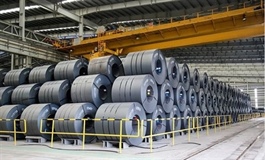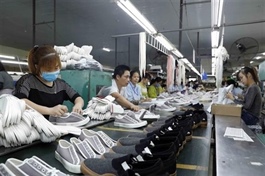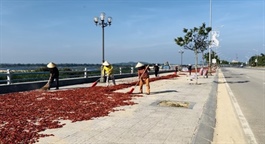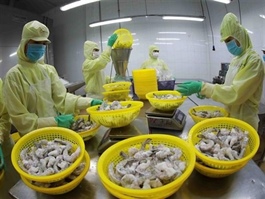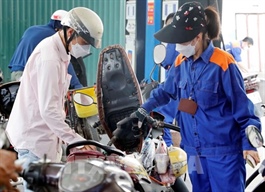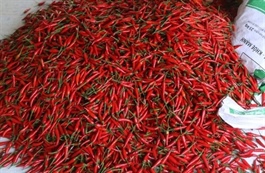Hanoi, HCMC should be places for coffee lovers: experts
Hanoi, HCMC should be places for coffee lovers: experts
There are approximately 660,000 hectares of coffee plantations in the country.
Vietnam should turn Hanoi and Ho Chi Minh City into world-renowned 'coffee cities', a conference has recommended, as the country seeks to generate $5 billion from coffee exports.

Coffee tasting at the event. Photo: VGP |
Alexander Lukas Gruber, Director of Master Roasters Sagion Service JSC, which owns the Alambé Finest VietNamese Coffee brand, believes that the main solution to developing coffee exports is to invest in building a brand, creating unique quality and classifying coffee into different grades such as good, premium and standard.
Exporting value-added coffee is essential, he said, adding that positive developments are taking place in Vietnam's soluble coffee industry.
Nguyen Duc Hung, director of Napoli Coffee Export Import Trading Production JSC, agreed, adding that despite the large number of coffee companies, Vietnamese coffee brands have a limited presence in the global market. On average, each province in Vietnam has 100 coffee shops, with Ho Chi Minh City having around 2,000, making a total of around 10,000 coffee shops nationwide.
"I have travelled to about 100 countries around the world and found very few Vietnamese coffee brands. I have come across the Trung Nguyen coffee brand on the shelves of supermarkets in a few countries, but the coverage and the market for Vietnamese coffee brands is much more limited when compared to Thailand and Malaysia," he said.
To achieve $5 billion in sustainable coffee exports, Hung called on the government, agencies and banks to help companies invest in machinery, international sales solutions, marketing, product development and brand building.
Speaking as a coffee analyst, Nguyen Quang Binh said that with the current market price of $4,000 per ton, Vietnam can fully meet its target of exporting $5 billion this year. The most important thing is the sustainable development of this industry, he said.
According to him, the selling price of green coffee beans is already historically high at $4,000 per ton. However, high-quality Vietnamese coffee products can reach prices of $6,000-$7,000 per ton, and specialty coffees can go as high as $8,000 per ton.
"It is necessary to support enterprises to enhance producing and processing specialty coffee to increase the value of coffee beans," he stressed.
Binh also urged state management agencies to provide financial support and loans to coffee trading companies.
According to Do Ha Nam, vice chairman of the Vietnam Coffee-Cocoa Association, coffee prices in the Vietnamese market have doubled in the first few months of 2024, making it difficult for many companies to buy coffee for export.
The export value of Vietnam's coffee in the 2022 - 2023 harvest season and early 2024 is experiencing remarkable growth, due in part to record high selling prices, which have reached VND100,000 ($4) per kg in recent days, he added.
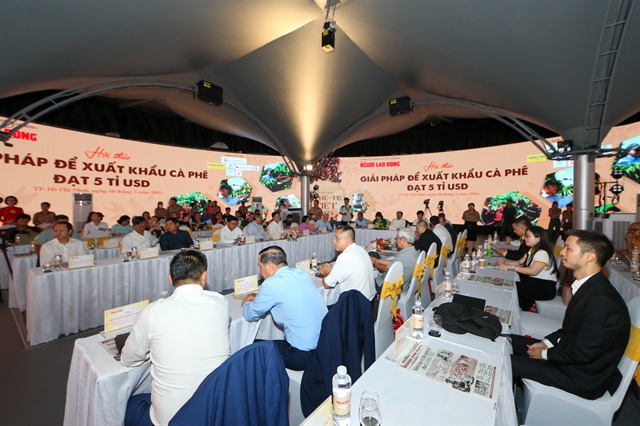
An overview of the conference to seek solutions to achieve $5 billion in coffee exports. Photo: thanhnien newspaper |
Speaking at a conference on the subject last week, Le Thanh Tung, Deputy Head of the Department of Plant Cultivation under the Ministry of Agriculture and Rural Development, said Vietnamese coffee products have made their way into many distribution systems around the world.
However, a systematic strategy to develop high-quality coffee is needed to increase competitiveness in the international market, he added.
Vietnam has nine million hectares of agricultural land, of which four million hectares are devoted to coffee and crops other than rice. The country has about 660,000 hectares of coffee plantations.
Specialty coffee currently accounts for only 2% of the total coffee area, mainly in the southern province of Lam Dong. Organic coffee also only makes up 3% of the total coffee area.
"We need to find out how producers and exporters can balance personal and national interests to promote coffee beans," he said.
Cao Xuan Thu Van, chair of the Vietnam Federation of Coffee Growers, suggested that provinces with special and organic coffee areas should form co-ops to build national brands and raise funds to maintain the high quality of the coffee and promote the brand as a high-end product at a premium price.
She also expressed the Alliance's desire to work with various entities to organize a major forum on coffee, bringing together farmers, cooperatives, companies, experts and government agencies to discuss the sustainable development of coffee.
During the forum, cooperatives are expected to sign agreements with coffee processing companies for production, supply, and distribution of clean coffee, promoting environmentally friendly coffee production, she said.



